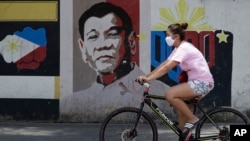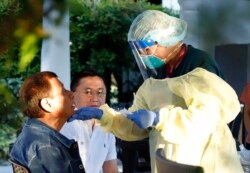Shutdowns in the Philippines through April 30 to contain the coronavirus spread are expected to give President Rodrigo Duterte a new burst of public support despite economic hardships on a largely impoverished population.
Duterte ordered in March that the National Capital Region be sealed off through April 14 and two weeks ago extended the order through April 30. The initial mandate came after officials discovered local transmission of the deadly coronavirus-induced respiratory disease COVID-19 that has infected 5,223 people in the Philippines and killed 335.
Metro Manila, population 13 million, plus surrounding Luzon Island are subject to shutdowns and curfews through month's end.
Economic stimulus and public health aid expected to total $23 billion, up to 6% of GDP, in the Philippines is helping to ease discontent, analysts believe. They say the aid is reaching the poor as well as others after a rough, confusing start. In March, one group of slum dwellers in Metro Manila protested along a highway after not receiving food supplies as expected.
Vice President Leni Robredo’s office, for example, had distributed food packages to health workers, hospitals and community centers, her office said in a statement March 18.
“Of course, there are challenges, but it’s slowing working into the system, so that’s why they were confident in extending the lockdown to April 30,” said Jonathan Ravelas, chief market strategist with Banco de Oro UniBank.
In a boost for Duterte, the Philippine Senate voted unanimously last month on a bill declaring a national state of emergency. The Senate gave Duterte special powers over the budget and government programs as related to coronavirus control, domestic media outlets reported.
Duterte – popular throughout his presidency that began in 2016 – has generated more popularity through televised “pep talks” about his government’s efforts, said Eduardo Araral, associate professor at the National University of Singapore’s public policy school.
“I think the food and the money has started to trickle in,” Araral said. “Duterte’s approval rating is still resilient. He’s on top of things, so that probably has kept the anger from boiling.”
Duterte said Monday he would consider a “gradual economic revival” aimed at helping people affected by shutdowns, according to a statement on the presidential office website.
Shelter-in-place orders and mass business shutdowns have gripped much of the world since February as governments try to control virus caseloads by reducing social interaction.
Groups outside the Philippines have opposed some of the restrictions. In India, migrant workers unable to return home protested Tuesday against an extension of the country’s lockdown. People asked to shelter at home in parts of the United States have defied the order. In Germany, the Constitutional Court banned a planned rally to advocate the right to assembly even during lockdown.
Land, air and sea travel in the Philippine capital region is restricted through April 30 and anyone entering the metro area for work from its farther-flung suburbs is supposed to show proof of employment. Shopping malls, a major source of retail income and service jobs, are closed.
The Southeast Asian country's economy depends partly on consumer spending, which is growing because of job creation on the back of new investments in factories, infrastructure and call centers. Officials hope GDP growth will ease poverty that afflicts one in five Filipinos. GDP could stall at no growth this year, Ravelas said.
Philippine officials have talked about replacing the lockdown next month with quarantines of infected communities or a phased-in lifting, people on the ground say. Public support could fade if harder restrictions last too long, analysts say.
In government, “they’re very careful about how they’re going to proceed with things, because there might be some sensitivity to public sentiments and public reaction about how the administration is actually addressing the virus,” said Herman Kraft, political science professor at University of the Philippines Diliman.







